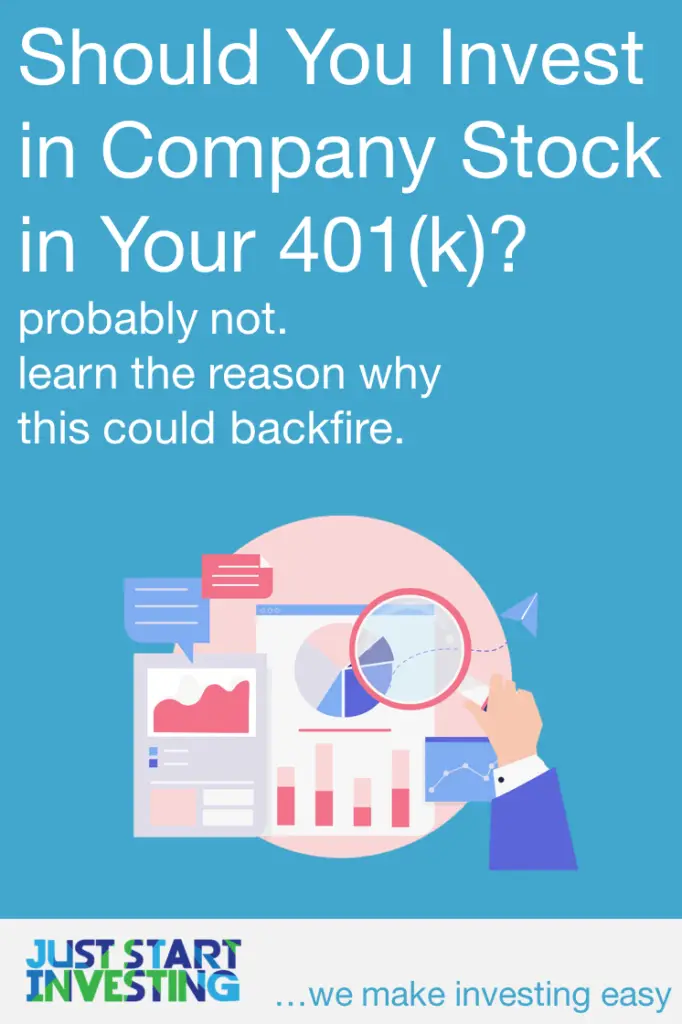This is part two of a two part series on 401(k)s: determining if you should invest in company stock in your 401(k).
If you missed part one, you can find it here. We highlight the five things you should do before maxing out your 401(k).
Maybe we’ll do a part three. Not sure yet… If you have any ideas or questions or 401(k)s then let me know!
Anyway, to the topic at hand.
While in this article we are focusing on whether or not you should invest in your company stock in your 401(k), this is also a broader topic. It includes if you should invest in your company stock at all (in a brokerage account, Roth IRA, through stock options, etc.).
We’ll dive into all of that and more, but first, a quick refresher on 401(k)s. If you’re already a 401(k) expert, you can skip ahead to the next section of the article.
…And, if you haven’t heard of Blooom, they’re a 401(k) robo-advisor that can give you a free 401(k) “check-up”, offering great tips and advice on how to optimize your 401(k). You can get your free analysis with them below:
Not Sure if You’re Doing this 401(k) Thing Right?
What is a 401(k)
A 401(k) is a type of investment account that is offered by your employer.
With a 401(k), you designate a percentage of your paycheck that you want to contribute and it’s automatically deducted and invested for you (based on your pre-selected investment vehicles).
The biggest benefit of a 401(k) is that your money is withdrawn from your paycheck pre-tax.
For example, say you normally get taxed 30% on your $50,000 income and want to invest 10% of your income.
With a 401(k): You would contribute $5,000 ($50,000 x 10%). You get to invest the money before paying the 30% tax!
With a brokerage account: You would only contribute $3,500 ($50,000 x 70% x 10%). You first have to pay taxes before you can invest.
On top of this huge tax break, sometimes your employer will provide a 401(k) match. This is when they also contribute to your 401(k). The most common practice is a company matching 50% of the first 6% you contribute (though this usually varies by company). Here are a couple examples to help illustrate the 50% match up to 6%:
- Example 1: You contribute 3%, employer contributes 1.5%. Total = 4.5%.
- Example 2: You contribute 6%, employer contributes 3%. Total = 9%.
- Example 3: You contribute 9%, employer contributes 3%. Total = 12%.
You should always max out your employer contributions (at least getting to example 2), this is free money!
Let me say that again, this is free money that you otherwise will not get! Take advantage of it.
With all of that said, there are a few rules that apply to your 401(k) to be aware of as well.
401(k) Rules:
- Max Contributions: The max contribution for any individual is $19,500 annually. The max contribution for the individual + employer is $58,000 annually.
- Withdrawal Rules: Money withdrawn before age 59.5 is subject to a 10% additional tax.
- Mandatory Withdrawals: Similar to Traditional IRAs, you must start withdrawing from the plan starting at age 72 (if you were born after June 30, 1949)
And, of course, your money is taxed at your normal tax rate when you do end up withdrawing it.
So, a 401(k) is a great. But should you buy your own company’s stock? The stock of your current employer?
Should You Invest in Company Stock in Your 401(k)?
No.
I don’t think you should, and there are some companies out there that agree with me. There are a few exceptions we’ll get to, but in general, no.
I say this for a couple reasons:
- You’re biased
- Diversification
Bias
On the first point, bias, I think there is a psychological factor that comes into play here.
Likely you work for the company you work for because you like the company and you think they will succeed (not always the case, but usually). Also, since you work there, you’re going to help them succeed, right? Why not buy the stock and reap the rewards of your hard work?
Put simply, you have no idea if the company will succeed or not. And, honestly, you likely will not make a meaningful difference.
Everyone at every company thinks it will or can do well. But some do and some don’t. Just because you are at the company does not change the odds.
Don’t be biased towards your own company.
Diversification
The next point is arguably more important, diversification. With investing (and most things) you don’t want to put all your eggs in one basket. This is an extreme case, but if you invest in your company stock and your company starts failing, both your job and investment are at risk.
That is a terrible situation to be in.
On top of diversifying your job from your investments, you also should be naturally diversifying you investments. Which usually means not picking individual stocks, regardless of whether or not you (or anyone you know) works at those companies or really believes in them.
But when you do work there, as previously mentioned, you’re just exposing both your job and investments to the same risk.
This is not diversification. It’s the opposite. It’s anti-diversification (centralization?).
The best way to stay diversified is to invest in index funds (and not put a large chunk of money into any one stock).
The One Exception to Company Stock in Your 401(k)
This exception muddies the water: stock options.
Stock options give employees the opportunity to buy stock at discounted prices. Or, sometimes, the company will offer to “match” stock purchases. For example, if you buy 100 shares, they will give you 100 shares for free.
Seems like a good deal.
It actually is a good deal.
The caveat is that (usually) this stock is not immediately available to you. You have to wait a stated time period before you can sell or access the stock, usually 2-5 years.
So, unfortunately, you cannot buy $1,000 worth of stock for $500 and then immediately sell the stock for $1,000 (netting a $500 gain). Though that would be a sweet deal.
And that is where things get tricky. Who knows where the stock will be in 5 (or even 2) years. It could go up, or it could go down (even below your discounted purchase price).
Though, when playing the averages, this is still a great deal.
Vegas odds would tell you to pull the trigger here. Chances are the stock will rise about 7% a year (because chances are every stock will rise about 7% a year).
For you Black Jack fans out there, it’s like getting a 10 on your first card with the dealer showing a 5. You should probably double down and make the bet. You could lose it all, but you’ll likely win!

And that is why this is the one exception. It’s up to you to evaluate:
- What is the stock option (the discount)?
- How long do you have to hold until you can sell (the shorter the better)?
- How do you feel the company is performing? Is it worth taking the gamble? Or would you rather take a safer route?
From there, you can make the call on if this would be a good option for you.
What About Net Unrealized Appreciation?
And one last thing to hit on… net unrealized appreciation (NUA).
NUA is another benefit to investing in your company stock – it’s a tax break.
To me, the benefit of this tax break is not worth the risk of not properly diversifying your investments.
However, if you want to learn more and form your own opinion, this post from Good Financial Cents provides a solid overview on Net Unrealized Appreciation.
The Better Alternative: Index Funds
So you know where I stand: it’s probably a bad idea to invest in company stock in your 401(k).
So what should I invest in?
They are low cost and highly effective investments that have historically provided great returns over the long term.
You can easily get started through brokers such as Charles Schwab or Betterment.

If you want to learn more about index investing and how you can get started, I wrote an index investing guide that you can find here.
Just Start Investing is a personal finance website that makes investing easy. Learn the simple strategies to start investing today, as well as ways to optimize your credit cards, banking, and budget. Just Start Investing has been featured on Business Insider, Forbes, and US News & World Report, among other major publications for its easy-to-follow writing.


I’m with ya!
Probably not what I would do either. Would feel much better being more diversified.
-chris
Agreed!
One word: Enron.
Really the only reason I might want to own my company stock is for the stockholder voting rights, and the other perks of being a stockholder. The 401k gives me the advantage of owning a larger amount of shares to give me a louder voice. Even then I’d only want a max of about 10% of my 401k’s value.
I don’t own any stocks of the company I work for, though.
A good point, especially with a smaller company, voting may be important to you. I’m not sold that it is more important than diversifying up your own investments, but 100% would depend on the situation.
I generally disagree. If you let bias control your investing, then maybe you shouldn’t be investing. If you love and use Microsoft or Apple products, are you going to avoid investing in a great company because you’re afraid you might be biased? If you can set aside bias and legitimately think the future of the company you work for is bright, why wouldn’t you own it.
I get the diversification argument, but still doesn’t seem like a good enough reason to not invest in a great company. Sure I wouldn’t put every dime I have after expenses into the company stock. There are many ways to diversify.
Just my 2cents
I get your point, but I am not arguing to not invest in great companies. I’m saying you don’t know if your company (or any company) is great. That is a huge pillar behind index investing – no one really knows where one company will go.
It’s easy to say now that Apple and Microsoft (and many other companies) are great. But many people at the time thought Enron was great (overused example, but it works). For every Apple and Microsoft there is a company that does not live up to expectations.
That is why I think Index Investing is the safest (and smartest) route to take.